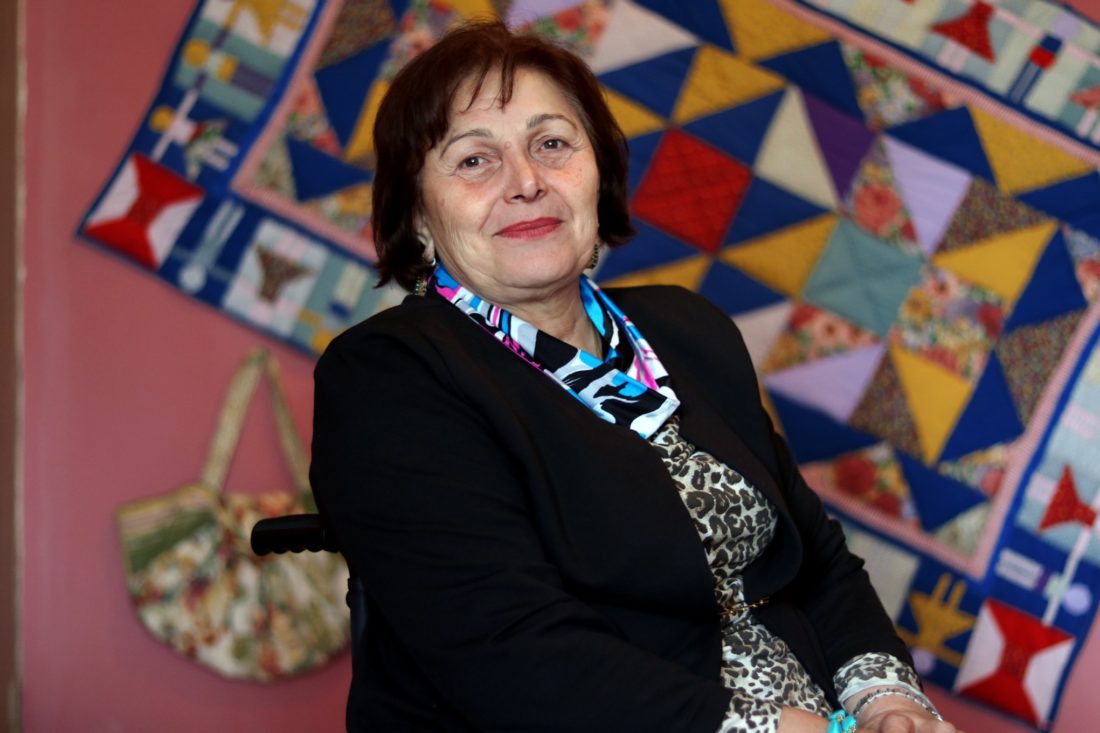Tina Bragvadze, 67-year-old, Gori
Wheelchair way of life
____________
I’d been living happy life before 1994, but then, like others, I also became the victim of the of the havoc wreaked in our country at that time.
We were attending relative’s funeral in a neighbouring village Qveshi. On our way back home we were carjacked by an armed gang. Our car was machine-gunned leaving neighbour woman sitting in our car dead on the spot. Heavily wounded, I spent 2 years in the hospital and returned home in a wheelchair after 8-month of rehabilitation in the hospital in Yerevan.
Despite having lived in two cities – in Kutaisi before marriage and after in Gori – I’d never seen someone in wheelchair before. So, my condition was shocking to me back then. I couldn’t even imagine I’ll never walk again. I wanted to die and never to come back from Yerevan. I thought I’ll be incapable of taking care of my family where there were four men and such a life was going to be meaningless. You know, being completely paralysed, I wasn’t even able to move my hands. I didn’t want to live such a life anymore.
Survival
—————————
During my stay in Yerevan, several young men were brought to the hospital from Georgia. Only after watching those boys and their parents in a terrible state, I thanked God it was me sitting in a wheelchair, and not my children. It tore my heart out seeing them but also gave me a new lease of life making me want to survive and pull myself together in order to help other disabled people. It was in Yerevan I first realized how many people were having the same problem around, and I wasn’t even aware of it.
First, I started struggling to become capable of turning over in the bed without help from four people. Eventually, by tireless exercising, I could transfer myself from bed to wheelchair and use it independently. In short, on coming back home, I already knew how to handle a wheelchair, but it took me two years to reach that condition.
After having returned to Georgia, I’ve made contact with Disabled League in Tbilisi and got actively involved in their work. We’ve spent many sleepless nights defending the rights of disabled people and struggled a lot for them to participate more actively in public life. Now, as I recall that time, we are much more advanced. The first time it was in 1997 when we, about 45 people with disabilities, went out in the streets of Gori and held a demonstration. Even today wheelchairs remain a problem, but back then no one had them, and some of the participants from different villages arrived with simple chairs. The gathering was aimed at meeting each other, figuring out how many people with disabilities there were, and learning about their problems. Also, during that demonstration, we asked city council to give us, people with disabilities, a room to make a club for gathering from time to time. That was, perhaps, for the first time, city administration and locals saw so many people with disabilities together. Following that, we – people with disabilities living in Gori – have been actively participating in various demonstrations and became an active part of the movement.
Since then I managed to attend training courses as well. I’ve learnt many things for all those years. Later, I’ve founded a non-governmental organization called Center of Prosperity and Development in Gori to improve living conditions of people with disability. Back then there wasn’t any NGO working with disabled people in Shida Kartli, and many problems remained unsolved. Even today, our organization is the only one dedicated to rights throughout the region.
We are trying to create opportunities for people with disabilities to live independently, to provide services for professional development and employment. For example, we have already opened a shoemaking workshop, trained some of the people with disabilities to make shoes, and have created a working space for them. Now the organization has several well-developed social businesses such as sewing workshop, ceramics and enamel studios where people with disabilities are employed. Apart from people who use wheelchairs, there are, of course, employees with other kinds of disabilities working in our enterprises. For example, there are girls with hearing loss working in the sewing workshop. By the way, the workshop produces anti-bedsore cushions and other items for disabled people. The employees have their own pretty good income. But it wasn’t easy to achieve.
Our organization has child day care centre for children with disabilities where 65 beneficiaries are studying – both girls and boys. They’re receiving informal education, developing essential skills for independent life and are getting used to a relationship with the society. For adults, there are vocational workshops where they learn various crafts (enamel, sewing, ceramics and pottery). With the support of our organization, several hundreds of disabled people were given an opportunity of integration into the society. There is our daycare centre branch in Kareli too where 15 beneficiaries are studying. We intend to open a daycare centre in Khashuri as well.
The state and rights of the disabled
———————————————————
We, people with disabilities, were forced to start fighting for our rights as there was no support from the government or it was less than a minimum. Back then, disability pension was 8 GEL. Later it became 12 GEL. Now the pension is 200 GEL, but this amount is nothing for the needs of disabled people – medicines, personal hygiene products, health care and so forth. 200 GEL are a drop in the bucket for them, but the state doesn’t care about our needs – it has other priorities.
The state is obliged to care about creating living conditions for disabled people in which they would feel themselves full members of the society. Under living conditions I mean not only the disabled facilities, but full access for the disabled to proper healthcare and rehabilitation. For disabled women, it’s especially complicated access to gynecological services. Going to the hospital is a big problem as it is not adapted properly, as it needs to be for the doctor to examine a woman. I’ve been there too and never wanted to go there again. It’s humiliating when you need four people to help you to sit down in a gynaecological chair. The present situation is impossible to improve without more care to the disabled from the government.
Women with disabilities
——————————————————————
Disabled women are having different and really special problems. These women are even more discouraged by their own families and are not allowed to go out. I may sound rude, but they treat disabled women as a complete nobody, and you know why?! They consider her useless for the family. I used to think the same about myself. I could see no point in life being incapable of taking care of my husband and children. For instance, there is one girl who visits our centre, who’s been under a lot of pressure by her own family. Sometimes, she even says she wants to kill herself to avoid the pressure. It’s quite common husbands to abandon their disabled wives with children.
You know, I even thank God for being disabled as it gave me a chance to see so many problems and help so many people.
Author: Ida Bakhturidze
Photo credit: Nino Baidauri
Translation: Nina Suramelashvili

